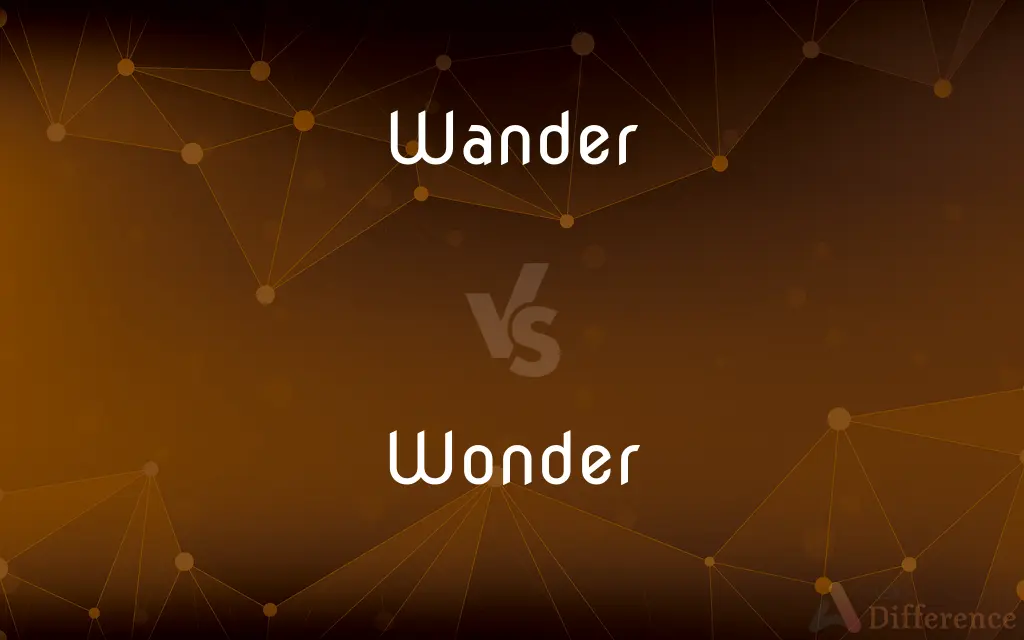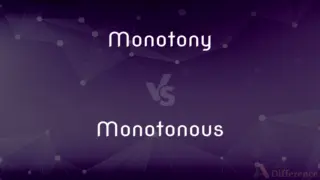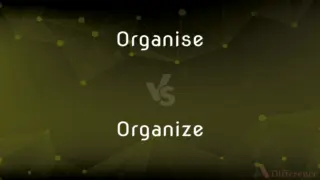Wander vs. Wonder — What's the Difference?
Edited by Tayyaba Rehman — By Fiza Rafique — Updated on September 21, 2023
Wander means to move around aimlessly or without a fixed direction. Wonder refers to the act of thinking curiously or being in awe. The two words are often confused but serve different functions.

Difference Between Wander and Wonder
Table of Contents
ADVERTISEMENT
Key Differences
The word Wander generally refers to the physical act of moving around without a specific goal or direction. Whether it's walking aimlessly in a park or traveling without a set itinerary, "wander" focuses on the element of unplanned movement.
Wonder, on the other hand, pertains to mental or emotional pondering or astonishment. It is an action that happens within the mind, often arising from curiosity, amazement, or doubt. You can "wonder" about the mysteries of the universe or "wonder" how a machine works.
The difference between Wander and Wonder extends to their grammatical usage. "Wander" is generally used as a verb describing the action of aimless movement. "Wonder" can function both as a noun and a verb, referring to either the act of thinking curiously or the emotion of awe itself.
In conversation and writing, Wander and Wonder are not interchangeable because they refer to different actions and concepts. Using "wander" when you mean to express curiosity or awe would confuse the reader or listener, as would using "wonder" when referring to aimless movement.
Both Wander and Wonder have nuanced connotations and usages that make them distinct, although they sound somewhat similar. They are often mistaken due to this phonetic resemblance, but careful consideration of their definitions and grammatical roles clears up any confusion.
ADVERTISEMENT
Comparison Chart
Meaning
To move aimlessly
To think curiously
Part of Speech
Verb
Both noun and verb
Context
Physical
Mental or Emotional
Synonyms
Roam, drift, meander
Ponder, marvel, question
Phonetic Similarity
Sounds like "Wonder"
Sounds like "Wander"
Compare with Definitions
Wander
To move around aimlessly.
He likes to wander around the city.
Wonder
To question or be curious about something.
I wonder what time it is.
Wander
To travel without a fixed destination.
They decided to wander through Europe.
Wonder
To be amazed or astonished.
The audience looked on in wonder.
Wander
To roam freely.
Cattle wander across the field.
Wonder
A feeling of awe or amazement.
The birth of a child is a wonder to behold.
Wander
Walk or move in a leisurely or aimless way
I wandered through the narrow streets
Wonder
To ponder or speculate.
She wondered about her future.
Wander
Move slowly away from a fixed point or place
His attention had wandered
Please don't wander off again
Wonder
The emotion aroused by something awe-inspiring, astounding, or surprising
Gazed with wonder at the northern lights.
Wander
Be unfaithful to one's regular sexual partner
He had married her and he was not going to be allowed to wander
Wonder
The quality that arouses such emotion
"Her long fair hair was girlish.
Wander
An act or instance of wandering
She'd go on wanders like that in her nightgown
Wonder
One that arouses awe, astonishment, surprise, or admiration; a marvel
Given all his unhealthy habits, it's a wonder he's lived this long. She was a wonder in that movie.
Wander
To move about without a definite destination or purpose.
Wonder
Often Wonder A monumental human creation regarded with awe, especially one of seven monuments of the ancient world that appeared on various lists of late antiquity.
Wander
To go by an indirect route or at no set pace; amble
We wandered toward town.
Wonder
An extraordinary or remarkable act or achievement
That teacher has worked wonders with these students.
Wander
To proceed in an irregular course; meander
The path wanders through the park.
Wonder
An event inexplicable by the laws of nature; a miracle.
Wander
To behave in a manner that does not conform to morality or norms
Wander from the path of righteousness.
Wonder
To have a feeling of awe, astonishment, surprise, or admiration
We wondered at the ease with which she settled into her new job.
Wander
To turn the attention from one subject to another with little clarity or coherence of thought
I had a point to make, but my mind started wandering.
Wonder
To be filled with curiosity or doubt
I could only wonder after hearing his excuse. I wondered about his late-night comings and goings.
Wander
To be directed without an object or in various directions
His eyes wandered to the balcony.
Wonder
To feel curiosity or be in doubt about
I wondered what kind of costume she would wear. I wondered why I said that.
Wander
To wander across or through
Wander the forests and fields.
Wonder
Remarkable or extraordinary, especially in being beneficial
Considers quinoa a wonder grain.
Wander
To be directed around or over
Her gaze wandered the docks.
Wonder
Something that causes amazement or awe; a marvel.
Wonders of the World seem to come in sevens.
Wander
The act or an instance of wandering.
Wonder
Something astonishing and seemingly inexplicable.
The idea was so crazy that it is a wonder that anyone went along with it.
Wander
(intransitive) To move without purpose or specified destination; often in search of livelihood.
To wander over the fields
Wonder
Someone very talented at something, a genius.
He's a wonder at cooking.
Wander
(intransitive) To stray; stray from one's course; err.
A writer wanders from his subject.
Wonder
The sense or emotion which can be inspired by something curious or unknown; surprise; astonishment, often with awe or reverence.
Wander
(intransitive) To commit adultery.
Wonder
A mental pondering, a thought.
Wander
(intransitive) To go somewhere indirectly or at varying speeds; to move in a curved path.
Wonder
(US) A kind of donut; a cruller.
Wander
(intransitive) Of the mind, to lose focus or clarity of argument or attention.
Wonder
(intransitive) To be affected with surprise or admiration; to be struck with astonishment; to be amazed; to marvel; often followed by at.
Wander
(countable) An act or instance of wandering.
To go for a wander in the park
Wonder
To ponder; to feel doubt and curiosity; to query in the mind.
He wondered whether penguins could fly. She had wondered this herself sometimes.
Wander
(uncountable) The situation where a value or signal etc. deviates from the correct or normal value.
Polar wander
Baseline wander in ECG signals
Wonder
That emotion which is excited by novelty, or the presentation to the sight or mind of something new, unusual, strange, great, extraordinary, or not well understood; surprise; astonishment; admiration; amazement.
They were filled with wonder and amazement at that which had happened unto him.
Wonder is the effect of novelty upon ignorance.
Wander
To ramble here and there without any certain course or with no definite object in view; to range about; to stroll; to rove; as, to wander over the fields.
They wandered about in sheepskins and goatskins.
He wandereth abroad for bread.
Wonder
A cause of wonder; that which excites surprise; a strange thing; a prodigy; a miracle.
To try things oft, and never to give over, doth wonders.
I am as a wonder unto many.
Wander
To go away; to depart; to stray off; to deviate; to go astray; as, a writer wanders from his subject.
When God caused me to wander from my father's house.
O, let me not wander from thy commandments.
Wonder
To be affected with surprise or admiration; to be struck with astonishment; to be amazed; to marvel.
I could not sufficiently wonder at the intrepidity of these diminutive mortals.
We cease to wonder at what we understand.
Wander
To be delirious; not to be under the guidance of reason; to rave; as, the mind wanders.
Wonder
To feel doubt and curiosity; to wait with uncertain expectation; to query in the mind; as, he wondered why they came.
I wonder, in my soul,What you would ask me, that I should deny.
Wander
To travel over without a certain course; to traverse; to stroll through.
Wonder
Wonderful.
After that he said a wonder thing.
Wander
Move about aimlessly or without any destination, often in search of food or employment;
The gypsies roamed the woods
Roving vagabonds
The wandering Jew
The cattle roam across the prairie
The laborers drift from one town to the next
They rolled from town to town
Wonder
Wonderfully.
Wander
Be sexually unfaithful to one's partner in marriage;
She cheats on her husband
Might her husband be wandering?
Wonder
The feeling aroused by something strange and surprising
Wander
Go via an indirect route or at no set pace;
After dinner, we wandered into town
Wonder
Something that causes feelings of wonder;
The wonders of modern science
Wander
To move or cause to move in a sinuous, spiral, or circular course;
The river winds through the hills
The path meanders through the vineyards
Sometimes, the gout wanders through the entire body
Wonder
A state in which you want to learn more about something
Wander
Lose clarity or turn aside especially from the main subject of attention or course of argument in writing, thinking, or speaking;
She always digresses when telling a story
Her mind wanders
Don't digress when you give a lecture
Wonder
Have a wish or desire to know something;
He wondered who had built this beautiful church
Wander
To deviate from a direct course.
The conversation started to wander off-topic.
Wonder
Place in doubt or express doubtful speculation;
I wonder whether this was the right thing to do
She wondered whether it would snow tonight
Wander
To lose clarity or coherence in thought or expression.
His mind began to wander during the meeting.
Wonder
Be amazed at;
We marvelled at the child's linguistic abilities
Wonder
Something that arouses admiration or amazement.
The Great Wall is one of the wonders of the world.
Common Curiosities
What does Wonder mean?
Wonder means to think curiously, be in awe, or feel amazement.
Can I use Wander and Wonder interchangeably?
No, they have different meanings and cannot be used interchangeably.
Can Wander refer to mental movement?
While mainly used for physical movement, it can metaphorically refer to a wandering mind.
What does Wander mean?
Wander means to move aimlessly or without a fixed direction.
Is Wonder a noun or a verb?
Wonder can be used both as a noun and a verb.
Can Wonder involve physical action?
No, Wonder is focused on mental or emotional states.
What's the origin of Wander?
Wander has Germanic origins related to the idea of moving without purpose.
Can Wander have negative connotations?
It can, especially when referring to a lack of focus or purpose.
Can Wonder have negative connotations?
Generally not, as it often denotes curiosity or awe.
Is Wander a noun or a verb?
Wander is generally used as a verb.
Are Wander and Wonder homophones?
No, they sound similar but are not identical in pronunciation.
What's the origin of Wonder?
Wonder comes from Old English, related to awe and astonishment.
What's the past tense of Wander?
Wandered.
Are Wander and Wonder often confused?
Yes, they are often confused due to their phonetic similarity.
What's the past tense of Wonder?
Wondered.
Share Your Discovery

Previous Comparison
Monotony vs. Monotonous
Next Comparison
Organise vs. OrganizeAuthor Spotlight
Written by
Fiza RafiqueFiza Rafique is a skilled content writer at AskDifference.com, where she meticulously refines and enhances written pieces. Drawing from her vast editorial expertise, Fiza ensures clarity, accuracy, and precision in every article. Passionate about language, she continually seeks to elevate the quality of content for readers worldwide.
Edited by
Tayyaba RehmanTayyaba Rehman is a distinguished writer, currently serving as a primary contributor to askdifference.com. As a researcher in semantics and etymology, Tayyaba's passion for the complexity of languages and their distinctions has found a perfect home on the platform. Tayyaba delves into the intricacies of language, distinguishing between commonly confused words and phrases, thereby providing clarity for readers worldwide.















































